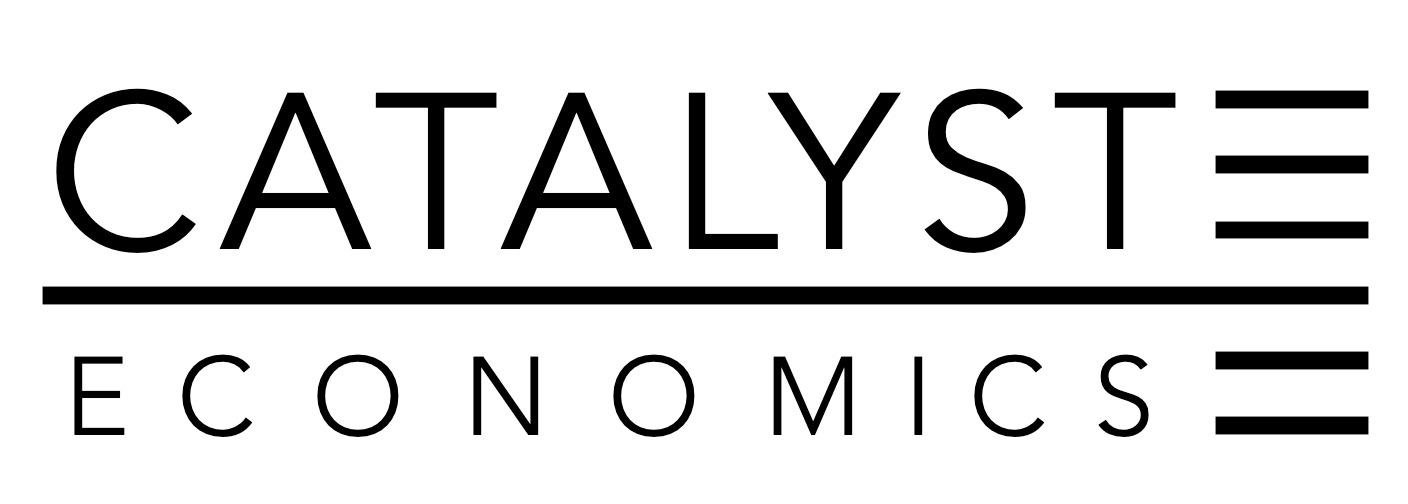
Actionable insights on the political economy of Myanmar
About Us
Established in 2024, Catalyst Economics harnesses the over fifty years of collective experience of its three founders to provide insights about Myanmar’s political economy and help stakeholders apply them to strategies that drive sustainable development.
Our goal is to spur new thinking about Myanmar’s complex challenges by bringing deep economic understanding to Myanmar’s important political, conflict and human rights questions.
Our work is defined by the depth of our knowledge – technical, contextual, and relational – and our ability to bring these components together. We look not just at what can be done, but how to do it in the context.
Our work is shaped by constant engagement with partners and stakeholders. It seeks to offer practical, context-specific inputs and options and inform locally-driven dialogues.
Our Team
-

Jared Bissinger
RESEARCH LEAD
Jared Bissinger is a development economist with extensive experience leading research projects and authoring high-level reports for UN agencies, NGOs and others. He has a decade and a half of experience working on Myanmar, as well as other countries in the Asia-Pacific region and globally. He provides analysis and research in economic policy, private sector development, business environment and social & inclusive development, and their intersection with politics, conflict, and other issues. Jared holds a PhD in economics from Macquarie University. He is a Visiting Fellow at the Myanmar Studies Program at the Institute of Southeast Asian Studies in Singapore. Jared is American and lived in Myanmar from 2011 to 2017.
-

Nyantha Maw Lin
CONTEXT & INITIATIVES LEAD
Nyantha Maw Lin is an analyst and advisor with extensive experience in government affairs, public policy and political risk assessment in Myanmar. Nyantha is the founder of nonprofit Anagat Initiatives. He is a 2018 Eisenhower Global Fellow. Nyantha holds a BA in international relations from Carleton College. Nyantha is Myanmar.
-

Romain Caillaud
OPERATIONS LEAD
Romain Caillaud is a risk and reputation management consultant with extensive experience advising corporations and nonprofits on strategic intelligence and public affairs. Romain has 20 years of experience working on Myanmar and other Asian countries including Japan where he is a resident. Romain is a 2023 Eisenhower Global Fellow and an Associate Fellow at the Myanmar Studies Program at the Institute of Southeast Asian Studies in Singapore. Romain holds an MA in international affairs from Sciences Po Paris. Romain is French and lived in Myanmar from 2008 to 2015.
Our Work
-

Current Insights
Providing analysis on Myanmar’s economy and political economy and its intersection with politics, society and human rights
-

Long-term Perspectives
Informing thinking and dialogue about a future political economy that drives inclusive development
-

Foundations
Contributing to a shared understanding of economics and political economy through knowledge-sharing and capacity building
Publications & Media
January 23, 2026 - https://www.iseas.edu.sg/articles-commentaries/trends-in-southeast-asia/watershed-or-non-event-myanmars-2025-26-elections-and-effects-on-its-economic-prospects-by-jared-bissinger/
Catalyst Economics's co-founder and research lead Jared Bissinger has published an analysis for ISEAS - Yusof Ishak Institute (ISEAS) on what the election in Myanmar means for the economy.
Jared argues that the election - however illegitimate - may help provide a limited economic recovery but is unlikely to transform the country’s economy in the way the 2010 election did. For Myanmar's economy to return to a trajectory of sustainable growth, numerous policies introduced by the SAC/SSPC will need to be rolled back. Fortunately, the military has an obvious precedent that can guide reforms: the Thein Sein administration’s economic reform agenda. However, the key challenges to economic policy reform are political—not technical—so the prospects for major policy reforms without broader political change are poor.
January 15, 2026 - https://open.spotify.com/episode/7k02Nn83fiSVwvYnhWjd0g?si=30fTuvTLRwiwuDb9Qyr3vw&t=8&ct=8
Catalyst Economics’s co-founder and context & initiatives lead Nyantha Maw Lin shared his insights on the ongoing sham elections in Myanmar and expected outcomes with Gregory Poling from the Center for Strategic and International Studies (CSIS).
November 26, 2025 - https://fulcrum.sg/how-china-outmanoeuvres-the-west-in-myanmar/
Catalyst Economics's co-founder and research lead Jared Bissinger authored an article for ISEAS - Yusof Ishak Institute (ISEAS) on how China's economic strategies and practices in Myanmar help it outmanoeuvre the West -
"China has repeatedly leveraged its economic links to shape the actions of non-state authorities, despite a stated policy of non-interference. It has halted trade, closed borders, cut off essential services, and clamped down on financial services."
September 23, 2025 - https://fulcrum.sg/for-myanmars-garment-sector-tariffs-are-a-setback-not-a-knockout-blow/
Catalyst Economics's co-founder and research lead Jared Bissinger authored an article for ISEAS - Yusof Ishak Institute (ISEAS) on how US tariffs are impacting Myanmar's garment sector -
"In the near-term, tariffs will lead to some order cancellations and factory closures, while knock-on effects – like declining demand, uncertainty, and supply chain reorientation – also carry risks. However, if Myanmar remains competitive in the EU market due to duty-free preferences, the country’s low-cost labour, and its unused industrial capacity, the new US tariffs may be more of a setback than a knockout blow for the garment industry.[...]Apart from US tariffs, many other challenges exist for Myanmar’s garment sector – political instability, financial risks, complex logistics, and poor infrastructure. Myanmar also faces questions about labour rights"
August 11, 2025 - https://www.spreaker.com/episode/ep101-myanmar-s-post-coup-economic-transformation-with-dr-jared-bissenger--67331974
Catalyst Economics's co-founder and research lead Jared Bissinger contributed insights on how Myanmar’s economy has evolved since the 2021 coup to podcast Straight Talk Southeast Asia.
June 2, 2025 - https://fulcrum.sg/the-international-labour-organisation-has-new-options-to-push-myanmars-regime-but-old-challenges-to-navigate/
Catalyst Economics's co-founder and research lead Jared Bissinger authored an article for ISEAS - Yusof Ishak Institute (ISEAS) on potential economic outcomes of the upcoming decision at the International Labour Organization on whether to invoke article 33 of its constitution against Myanmar.
"In response, the ILO will now consider invoking A.33 — its most serious option — used only when members fail to carry out COI recommendations or judgments from the International Court of Justice. It has been invoked only twice in history: against Myanmar in 2000 and Belarus in 2023."
June 3, 2025 - https://bookshop.iseas.edu.sg/publication/7960
Catalyst Economics’s co-founder and operations lead Romain Caillaud co-authored an article on Myanmar for the 2025 edition of the ISEAS-Yusof Ishak Institute’s Southeast Asian Affairs
May 8, 2025 - https://open.spotify.com/show/41pJlCKb4CtzzJfSmOKkrB
Catalyst Economics's co-founder and research lead Jared Bissinger took part in a podcast with Frontier Myanmar where he discussed his recent report for ISEAS - Yusof Ishak Institute (ISEAS) on the economic governance in rebel controlled territories in Myanmar.
May 5, 2025 - https://fulcrum.sg/myanmars-earthquake-threatens-a-lasting-economic-scar/
Catalyst Economics's co-founder and research lead Jared Bissinger authored an article on the lasting economic scars the recent earthquake in Myanmar will leave, for ISEAS - Yusof Ishak Institute (ISEAS).
"The urgent humanitarian situation following the earthquake presents challenges which will likely persist despite responses from several countries, including neighbours. Beyond the humanitarian crisis, the earthquake threatens to compound Myanmar’s economic malaise. Unless the SAC rethinks its economic approach, the earthquake aftermath may lead to increased poverty and inflation, and decreased exports and productive capacity, with effects lasting years."
April 30, 2025 - https://www.iseas.edu.sg/articles-commentaries/trends-in-southeast-asia/economic-governance-of-non-state-authorities-in-myanmar-potentials-and-pitfalls-by-jared-bissinger/
Catalyst Economics's co-founder and research lead Jared Bissinger authored an article on the potentials and pitfalls of the economic governance of non-state authorities in Myanmar for ISEAS - Yusof Ishak Institute (ISEAS).
"Since Myanmar’s 2021 military coup, the reach and influence of non-state authorities have spread considerably, providing them with greater scope to govern economic activity in parts of Myanmar. [...] Collaboration to develop and implement joint quasi-federal governance for national-level economic powers, such as trade, has been limited. This raises questions about whether Myanmar’s non-state authorities can offer a viable national-level alternative to the State Administration Council (SAC), or whether they constitute an alternative only for some subnational areas and powers."
April 9, 2025 - https://fulcrum.sg/myanmars-military-regime-is-violating-its-international-economic-obligations/
Catalyst Economics's co-founder and research lead Jared Bissinger authored an article on how the Myanmar military junta is not abiding by its international economic obligations and implications for ISEAS - Yusof Ishak Institute (ISEAS).
"Myanmar’s violations of its international economic obligations contribute to inflation and increasingly impoverish the country’s population. They also threaten to diminish the impact of financial assistance for Myanmar’s recent earthquake."
March 28, 2025 - https://www.myanmarearthquakehelp.com/en/donate
In response to the major earthquake that has struck central and upper Myanmar, Catalyst Economics encourage donations to this initiative that will deliver swiftly, trustfully and effectively aid and supplies to impacted communities. Our thoughts go to the victims of this disaster and all the people affected by this tragedy.
February 13, 2025 - https://www.iseas.edu.sg/articles-commentaries/iseas-perspective/2025-11-challenges-and-priorities-for-myanmars-conflicted-economy-by-jared-bissinger/
Catalyst Economics's co-founder and research lead Jared Bissinger contributed to this analysis for ISEAS - Yusof Ishak Institute (ISEAS).
“Myanmar’s economy in 2024 continued to struggle with slow growth, high inflation, increasing poverty, and declining real wages. […] Myanmar’s near-term economic prospects are weak. SAC rule is creating significant and potentially long-lasting economic distortions. In non-state-controlled areas, economic prospects are also constrained, weighed down by conflict, uncertainty, the lack of economic governance experience, and exclusion from international economic systems.”
February 3, 2025 - https://www.youtube.com/live/bWOOppmCoQ8
Catalyst Economics's co-founder and context & initiatives lead Nyantha Maw Lin participated in a panel discussion at the The Foreign Correspondents' Club of Thailand that took stock of the situation in Myanmar four years after the coup.
January 27, 2025 - https://fulcrum.sg/myanmar-in-2025-change-or-plus-ca-change/
Catalyst Economics's co-founder and research lead Jared Bissinger contributed to this analysis for ISEAS - Yusof Ishak Institute (ISEAS) together with co-authors Moe Thuzar, Su Mon Thazin Aung, Kyi Sin and Kyaw Yin Hlaing.
The prospects for the Myanmar economy in 2025 remain dire: "Ongoing conflict and the SAC’s policies geared primarily toward regime survival will continue to weigh down Myanmar’s economic prospects."
December 28, 2024 - https://www.youtube.com/watch?v=ID-MpbJh_q8
Catalyst Economics' co-founder and research lead Jared Bissinger was interviewed by Radio Free Asia for a program on the state of the Myanmar economy and links to the political and armed conflicts.
November 19, 2024 - https://www.irrawaddy.com/news/burma/as-myanmars-garment-industry-unravels-desperation-is-rising.html
Catalyst Economics' co-founder and research lead Jared Bissinger was quoted in an article by The Irrawaddy where he warned that “wages at Myanmar’s garment factories are so low they can no longer feed families and could undermine a sector that had provided one of the few paths for young women from impoverished villages to enter the country’s formal economy."
November 5, 2024 - https://fulcrum.sg/myanmars-agricultural-sector-under-the-sac-an-uncertain-future/
Catalyst Economics' co-founder and research lead Jared Bissinger published an analysis of Myanmar's agricultural sector since the 2021 military coup for ISEAS - Yusof Ishak Institute: “The expansion of conflict, rising input prices, increasing price controls, and anecdotal evidence of reduced planting suggest challenges ahead for Myanmar’s agriculture sector."
October 17, 2024 - https://www.iseas.edu.sg/articles-commentaries/iseas-perspective/2024-86-the-state-administration-council-and-the-restyling-of-myanmars-economy-by-jared-bissinger/
Catalyst Economics' co-founder and research lead Jared Bissinger writes on winners and losers in the economy of post-coup Myanmar for ISEAS - Yusof Ishak Institute: “While businesses and individuals in post-coup Myanmar have generally fared poorly due to economic decline, some businesses have survived or grown. Of these, some – including those owned by the regime, key leaders and their families – have exploited their positions and connections since the coup for significant financial benefit. Others have grown not because of their relationships with the military but because of their business characteristics, business model, managerial initiative, or other circumstances.”
October 7, 2024 - https://www.economist.com/asia/2024/10/17/myanmars-military-junta-has-conjured-up-a-crazy-currency-system
Catalyst Economics' co-founder and research lead Jared Bissinger's recent analysis on forex dynamics in Myanmar for ISEAS - Yusof Ishak Institute was referenced in an article by The Economist: “"In the 12 months ending in June, the Tatmadaw, the army that overthrew Myanmar’s elected government in 2021, earned Ks6.4trn ($1.8bn) from the fx market, according to a recent analysis by Jared Bissinger. [...] The result is that a third of exporters’ earnings are syphoned off to the regime, calculates Mr Bissinger."
August 23, 2024 - https://fulcrum.sg/lagging-wages-hurting-myanmars-garment-workers-and-undermining-the-industry/
Catalyst Economics's co-founder and research lead Jared Bissinger published an article for ISEAS - Yusof Ishak Institute on how lagging wages in the garment sector in Myanmar are hurting workers and the industry: “The low wages in Myanmar’s troubled garment sector are just one indicator of how badly the political upheaval and violence have affected people’s lives. Foreign garment brands and factories still in-country should consider workers’ views that they stay but increase wages.”
August 20, 2024 - https://www.irrawaddy.com/news/burma/myanmars-junta-is-funding-its-war-through-forex-scams-economists-say.html
Catalyst Economics's research lead and co-founder Jared Bissinger provides comments for an article in The Irrawaddy that references his recent reports on the forex manipulation by the Myanmar junta and on trade risks and opportunities in border areas in the current conflict context: ““These forex controls give the Myanmar military widespread power and opportunities for profit. Some discounted forex likely goes to private companies that facilitate military-related imports,” [Bissinger] said. “Some discounted forex does go for legitimate imports, including fuel for civilian use. But getting that forex requires permission from the regime, which can entail a long wait or use of connections.”
August 4, 2024 - https://www.scmp.com/week-asia/opinion/article/3273004/myanmars-economy-sinks-deeper-quagmire-junta-extends-coercive-control
Catalyst Economics's co-founder and operations lead Romain Caillaud's commentary for ISEAS - Yusof Ishak Institute on the dire state of the Myanmar economy has been re-published by the South China Morning Post: “The State Administration Council’s (SAC) coercive and controlling approach to the economy does not bode well for Myanmar’s mid- to long-term prospects. In the past quarter, conflicts in Rakhine and Shan States have intensified, and humanitarian crises nationwide have worsened. These issues have compounded the negative impacts of the SAC’s economic policies, which seek to secure the junta’s interests through control and coercion.”
July 29, 2024 - https://fulcrum.sg/myanmars-economy-deeper-in-the-quagmire/
Catalyst Economics's co-founder and operations lead Romain Caillaud published a commentary for the ISEAS - Yusof Ishak Institute on Myanmar's mounting economic challenges: “China is not alone in its concern that the current quagmire in Myanmar would increasingly threaten its economic interests. Battles continue to rage across Myanmar, and the impacts of the intensifying conflict are increasingly spilling over borders, negatively impacting the economies and people of several of Myanmar’s neighbours. The sense of gloom and doom also continues for Myanmar’s economy as the coup wears on.”
July 23, 2024 - https://fulcrum.sg/myanmars-trade-takes-a-turn-for-the-worse/
Catalyst Economics's co-founder and research lead Jared Bissinger published a commentary for ISEAS - Yusof Ishak Institute, which looks at how trade in Myanmar is evolving under the SAC: “While Myanmar’s trade increased significantly in 2022, the drivers of this were unsustainable. Since then, the longer-term implications of Myanmar’s trade regulations have started to show, compounded by the effects of prolonged conflict and a conscription law that have had significant economic implications. Together, these developments and other structural changes in the economy suggest that Myanmar’s trade performance is set for an extended and durable downturn that the current military rulers will not be able to reverse."
July 11, 2024 - https://fulcrum.sg/myanmars-military-funds-its-war-through-forex-policy/
Catalyst Economics's co-founder and research lead Jared Bissinger published a commentary for ISEAS - Yusof Ishak Institute that analyses how the junta has weaponised forex policy: “Myanmar’s military regime is increasingly utilising foreign exchange policy to extract funding, which threatens to hasten economic decline. It is important to find avenues for economic activity outside the system for the benefit of Myanmar’s people.”
Catalyst Economics's co-founder and research lead Jared Bissinger published a report for ISEAS - Yusof Ishak Institute that outlines the risks and opportunities in terms of border trade emerging from recent battlefield gains by anti-junta forces in Myanmar: “Since the start of Operation 1027, Myanmar’s resistance groups have gained control over large parts of key overland trade routes and a number of important border crossings, fundamentally changing the realities in the control of border trade. Despite these losses, the State Administration Council (SAC) retains control-of-trade-related institutions that are vital for accessing an international trading system characterized by state-to-state interactions—giving them significant influence over trade even if they do not control trade routes and border crossings.”


